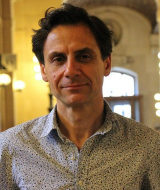The radical reformer
With his poll ratings falling, Benoît Hamon is unlikely to make it into the final round of the French presidential election next month. But his candidacy has been a breath of fresh air for French socialists after François Hollande’s unimpressive...
With his poll ratings falling, Benoît Hamon is unlikely to make it into the final round of the French presidential election next month. But his candidacy has been a breath of fresh air for French socialists after François Hollande’s unimpressive term, argues Philippe Marlièr
When Benoît Hamon emphatically defeated Manuel Valls, the former prime minister, in the French socialist primary elections earlier this year, the British media were quick to label the victor a representative of the ‘hard left’ or even a ‘French-style Corbynista’. Those tags could not be wider of the mark. Hamon is certainly on the left-wing of the party, however his progressive politics bear little resemblance, in style and in content, with those traditionally associated with the radical left.
Until his primary election victory, the 49-year-old presidential candidate was no household name in France. Yet, unlike Emmanuel Macron, his centrist opponent, Hamon is not a political neophyte. He joined the Parti Socialiste (PS) in 1988 and since then has had a party career spanning a 25-year period, starting off as leader of the Socialist Youth from 1993 to 1995.
His involvement in internal party politics make him, according to his critics, an ‘apparatchik’. There, he is similar to Valls and to Corbyn who both have also had significant stints as party officials. But unlike Corbyn, Hamon has managed to reach out to constituencies beyond the traditional territory of the party left. He was the protégé of the party centrist Martine Aubry who has always had a soft spot for the man she motheringly calls ‘Benoît’. Hamon served as party spokesman during Aubry’s spell as party leader between 2008 and 2012.
But Hamon’s political experience stretches beyond the realm of party politics: he was an MEP from 2004 to 2009, and is currently an MP for the Yvelines department to the west of Paris. He was appointed junior minister for social economy in 2012, and then two years later to the senior role of minister of national education. Hamon resigned from the Valls government in the summer of 2014 – together with Arnaud Montebourg, another left-wing critic – in protest at François Hollande’s supply-side economics, his austerity policies and what they saw as his quasi-complete alignment with the big business agenda.
The PS’ radical shift to the right under the Hollande presidency explains the current débâcle of the party rightwing. Hamon won the primary election because rank and file Socialist party activists and sympathisers felt that their party’s five-year period office had been dominated by a neoliberal agenda with little on offer for ordinary salaried workers and feared their party was running the risk of extinction as a progressive and pro-social justice force. Hence their choice of a leader who would not be afraid of promoting and defending true social democratic values against Manuel Valls, positioned on the PS’ very right wing.
Valls was proposing more of the same as Hollande: policies which have made the incumbent president so unpopular that he was unable to run again this year. To top it all, the former prime minister made the left increasingly uncomfortable with his die-hard brand of authoritarian republicanism and with what some of his critics saw as his inflammatory comments on Islam. In other words, Hamon’s victory was an act of selfdefence and survival for the left. Voters did not want the PS to shift to the centre and align itself with François Bayrou and his centre-right Mouvement Démocrate.
The former education minister indeed proposed a clean break with the Hollande-Valls neoliberal years. He unashamedly put forward a left-wing social democratic policy platform which combines bold and radical proposals on the economy and civic liberties, as well as more traditional left-wing measures on jobs, salaries and public services.
Hamon’s core proposals are original – at least in the context of the French left: a universal basic income (although now restricted to people earning less than 1.9 times of the set minimum wage) and a further reduction of working time. Hamon stands alone in his defence of a basic income, a proposal which is popular amongst the young and unemployed.
Hamon is liberal-minded, as well as a pragmatist when it comes to individual freedoms and cultural diversity. It is on the question of laïcité – the secularism that is so central to the French republic – that he is truly showing his progressive instincts. Here, Hamon departs from the large left/right consensus by defending a resolutely pluralist and multiculturalist model of citizenship.
Unlike his left-wing rival Jean-Luc Mélenchon, Hamon does not argue that the hijab is a sign of ‘female subordination’, but instead considers that it is up to women to freely decide what they should wear. His appeasing message on race and intercultural relations – in a national context of open hostility to Islam – have led some of his hateful critics to nickname him ‘Bilal Hamon’. The socialist said that he would be wearing the tag as a badge of honour. As president, he would recognise the Palestinian state, a departure from the traditional pro-Israeli stance of the PS.
Benoît Hamon wants to end the 5th republic – Charles de Gaulle’s institutions – which have supplied the institutional framework of a de facto ‘republican monarchy’, with its absurd pomp and its dangerous over-concentration of power in the hands of the president. If elected, he would launch a 6th republic which would shift the balance of power to the prime minister and parliament. Pro-European, he advocates fiscal harmonisation in the European Union, and would oppose the CETA and TAFTA free trade deals with Canada and the US.
Hamon has the most eco-friendly policy platform ever of any socialist presidential candidate. He proposes huge investments in renewable energy (by 2025, renewable sources would provide 50 per cent of French energy) and wants to protect the “common goods” (air, water, biodiversity) by formally guaranteeing them in the constitution.
In short, Benoît Hamon blends the two main traditions of the French left. Namely, the ‘first left’ that is statist and is essentially interested in socio-economic issues and the ‘second left’ that favours the devolution of powers at all echelons, is anti-authoritarian and thinks that postmaterialist issues are as important as socio-economic ones.
In the run-up to the first round of the presidential election, the socialist candidate has a mountain to climb: to his left, Jean-Luc Mélenchon, a former socialist member of the PS will probably secure between 10 and 15 per cent of the share of the votes. Mélenchon is appealing to traditional left-wing voters who have radicalised and think that the Hollande presidency has been an unmitigated disaster. Most of these people are committed to never voting for any socialist candidate again. To his right, Emmanuel Macron appears to be, as things currently stand, the likely beneficiary of tactical voting. A significant fraction of the centre-left electorate might not vote PS this time round because they want to support the candidate best placed to avoid a Le Pen-Fillon run-off, an absolute non-choice between a neo-Thatcherite under investigation in a corruption scandal and the figurehead of the far right. This is the main reason why the untested Macron is running so high in the polls at present.
Benoît Hamon, a modern left-wing social democrat, has just a couple of weeks left to prove to his doubters and opponents that his brand of radical reformism represents the future of the French left. In the current crazy circumstances, and with the left-wing vote evenly split between Mélenchon and himself, it seems unlikely that he will manage to do so. The left is largely expected not to make it through to the second round. But some of Hamon’s ideas and his more relaxed and informal style will surely endure as great contributions to reconstruct an out of touch French left.

